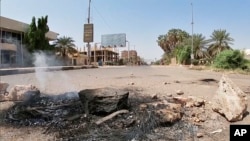Earlier this month, the government announced plans to dig mass graves after Sudan’s top public prosecutor said mortuaries were overcrowded, noting many remains were decaying said the Guardian.
A member of the burial committee for the unknown bodies, Aqil Al Noor Siwar Al-Dahab, confirmed to VOA a mass burial has been postponed until further notice.
Dozens of people demonstrated in front of the public prosecutor’s offices in Khartoum over the weekend.
In April, the Sudanese Sovereignty Council decided to form a technical committee to bury the unidentified bodies to prevent environmental and health risks, but the move angered families of the missing.
Fadia Khalaf Allah, a member of the Missing Initiative, a volunteer organization that helps families document the lists of missing individuals, says the group rejects any move to bury the bodies before a post mortem process is undertaken.
At a news conference in Khartoum, Allah said they have lost trust in Sudan’s judicial body and the group wants international experts to help carry out the postmortems.
“We completely lose trust in judicial institutions and forensic institutions, that is why we need to seek international experts. A team from Argentina came to Sudan for this purpose but they were not granted permission to visit the mortuaries and they were expelled,” said Allah.
Last week, the Public Prosecution's investigation committee into disappearances decided not to participate in autopsies of the unidentified bodies unless it was accompanied by investigations conducted at the morgues with the help of an international team.
Last May, the Khartoum State Ministry of Health announced the closure of the Bashair Hospital Mortuary south of Khartoum after approximately 1,000 unidentified bodies began decomposing.
Rihab Mubarak, who lost her 25-year-old brother Musab Mubrak in June 2019 during pro-democracy demonstrations, told South Sudan in Focus her family rejects any unilateral decision by authorities to bury the bodies.
Although there is no clear evidence her brother’s body is among those piled up in mortuaries, Mubarak says her family opposes a mass burial because it would bury the truth.
“If these bodies are buried in such a hurry, that would wipe away all the existing truth about all the missing individuals. There are thousands of them who are still missing since 2020 up to now and their families are unable to find their whereabouts,” Mubarak told VOA.
Burying bodies without carrying out proper, post-mortem procedures is illegal, said legal activist Osman Al Basri, adding that the bodies are discomposing due to negligence on the part of authorities.
“We don't support the piling up of corpses, but we are in support of proper procedures that preserve the rights of the missing individuals, preserve the environment and preserve the dignity of the corpses,” Al Basri told South Sudan in Focus.
The issue of lost loved ones is part of the sacrifice the Sudanese people made during the revolution, said Sudanese legal expert Adil Abdulghani. He said any illegal procedure carried out with the unidentified bodies may delay the justice process.
“It is true that there was a mistake committed by the former attorney general, but this situation cannot continue to exist without a proper solution. We cannot keep the situation as it is now,” Abdulghani told VOA.
After several meetings, September 25 was set as the date for the start of autopsies in preparation for burial according to strict procedures and in compliance with the protocol of the International Red Cross in dealing with unknown bodies.







